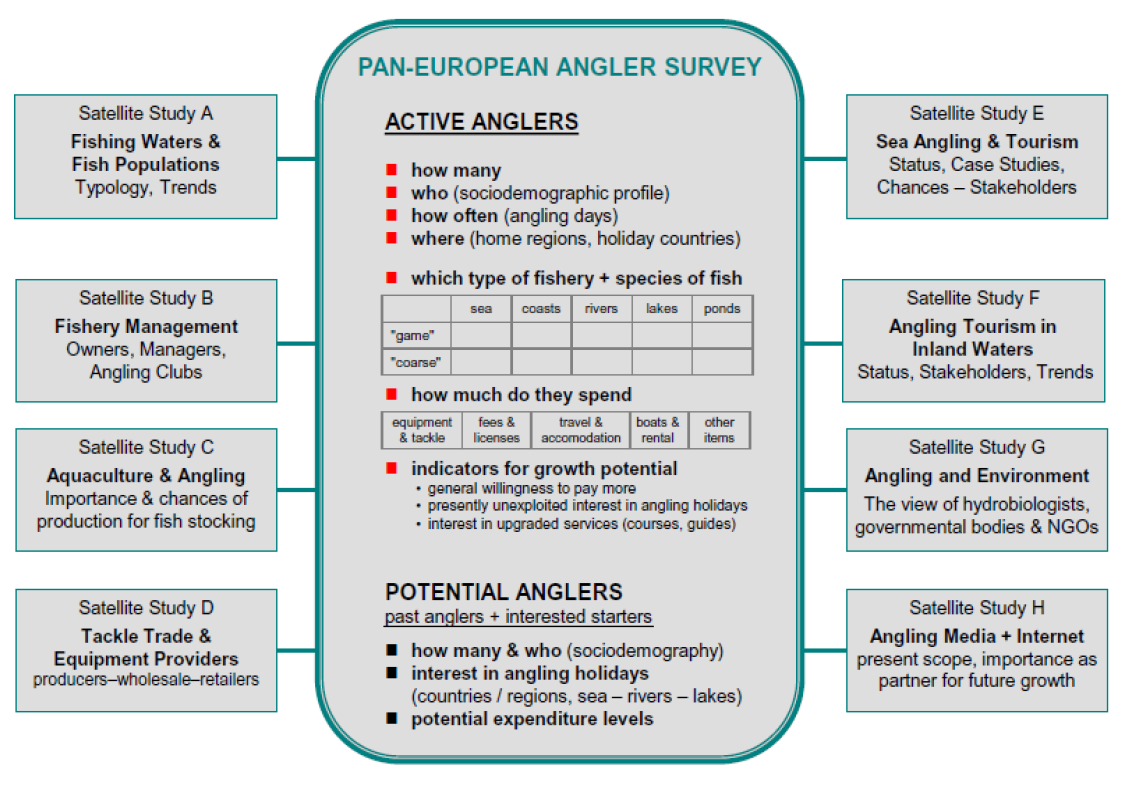Socio-economic data
Studies on angling in Europe are scarce, both at the European and national levels. They usually focus only on sea angling, while freshwater angling can be significant share in some countries. Furthermore, it is difficult to compare them with each other, given that terms, definitions and methodology often differ. That is why the EAA is calling on the European Commission to deliver a pan-European study on recreational angling (both at sea and in freshwaters) every five years, as it is already the case in the US and in Canada.

EAA’s proposal for a pan-European anglers survey
Definitions
One definition that seems to be agreeable by all parties is the one of the International Council for the Exploration of the Sea (ICES) for marine recreational fisheries: “the capture or attempted capture of living aquatic resources mainly for leisure and/or personal consumption. This covers active fishing methods including line, spear, and hand-gathering and passive fishing methods including nets, traps, pots, and set-lines” (2013).
A study by the Centre for Environment, Fisheries and Aquaculture Science (Cefas) distinguishes between different terms related to recreational fishing:
|
Recreational fishing
|
Recreational fishing is fishing which is:
• not deemed to be commercial fishing;
• is not undertaken for predominantly subsistence purposes;
• is not undertaken for primarily cultural or heritage purposes
|
|
Angling
|
Angling is the activity of catching or attempting to catch fish on hooks, principally by rod and line, pole or hand-held line. Note that this also includes the use of hook-less lures where fish capture depends on entanglement (e.g. billfish, squid, eels)
|
|
Recreational angling
|
Recreational angling is the activity of catching or attempting to catch fish, principally by rod and line, pole or hand-held line for non-commercial purposes; recreational anglers do not sell the fish they catch.
|
|
Sports fishing
|
Sports fishing is generally perceived to be a sub-set of recreational angling, although the distinction varies between countries.
|
|
Non-angling recreational fishing
|
Other forms of non-commercial recreational fishing (i.e. not with hook and line) include:
• small boats equipped with nets or longlines;
• use of fish or crustacean pots;
• capture of fish by divers with spear guns;
• hand-gathering of shellfish from the beach or shore
|
Reproduced from M. G. Pawson, D. Tingley, G. Padda and H. Glenn, EU contract FISH/2004/011 on “Sport Fisheries” (or Marine Recreational Fisheries) in the EU, March 2007
European Parliament study
In 2017, the European Parliament Fisheries Committee (PECH) commissioned a study on “Marine recreational and semi-subsistence fishing – its value and its impact on fish stocks.” The study only focuses on marine recreational fishing, and fails to take into account the value and impacts on freshwater recreational fishing.
It concluded that the “total economic impact of marine recreational fishing amounts to 10.5 billion euro, supporting almost 100,000 jobs. The impact varies between fish stocks, representing 2-72% of total catch.”
Estimation of direct, indirect and induced effects, for production and employment for European countries with marine recreational fisheries (selection)
|
Country
|
Total production
(million euro)
|
Total employment
(FTEs)
|
|
Belgium
|
60
|
407
|
|
Bulgaria
|
61
|
593
|
|
Croatia
|
39
|
383
|
|
Cyprus
|
9
|
161
|
|
Denmark
|
249
|
1,877
|
|
Estonia
|
10
|
213
|
|
Finland
|
180
|
1,311
|
|
France
|
2,324
|
24,527
|
|
Germany
|
176
|
1,957
|
|
Greece
|
106
|
1,116
|
|
Ireland
|
195
|
2,029
|
|
Italy
|
460
|
4,562
|
|
Latvia
|
16
|
358
|
|
Lithuania
|
26
|
586
|
|
Malta
|
6
|
62
|
|
Netherlands
|
270
|
1,835
|
|
Poland
|
39
|
433
|
|
Portugal
|
240
|
2,513
|
|
Romania
|
168
|
1,679
|
|
Slovenia
|
36
|
374
|
|
Spain
|
374
|
3,921
|
|
Sweden
|
1,010
|
8,921
|
|
UK
|
2,370
|
24,632
|
|
Total EU
|
8,422
|
84,452
|
Reproduced from Hyder, K, Radford, Z, Prellezo, R, Weltersbach, MS, Lewin, WC, Zarauz, L, Ferter, K, Ruiz, J, Townhill, B, Mugerza, E, & Strehlow, HV, 2017,
Research for PECH Committee – Marine recreational and semi-subsistence fishing - its value and its impact on fish stocks, European Parliament, Policy Department for Structural and Cohesion Policies, Brussels
European Parliament Committee on Fisheries’ hearing on “Data collection and recreational fisheries”
On 30 November 2021, the Committee on Fisheries of the European Parliament held a public hearing on “Data collection and recreational fisheries”. This meeting was the opportunity to highlight a severe lack of data on recreational fisheries, a sector that has been increasingly managed at European level over the past years.
Invited to speak at this hearing, EAA and EFTTA made a strong call for a pan-European survey to be undertaken every 5 years to evaluate the economic and social value of the recreational fisheries sector.
Better data on the environmental, economic and social impacts of recreational fisheries is essential to improve the management of these fisheries and to achieve the Common Fisheries Policy (CFP) objectives. EAA and EFTTA also urged the Members of the European Parliament to work for the inclusion of recreational fisheries in the CFP as an integral sector.
You can find a more detailed summary of the meeting
here.